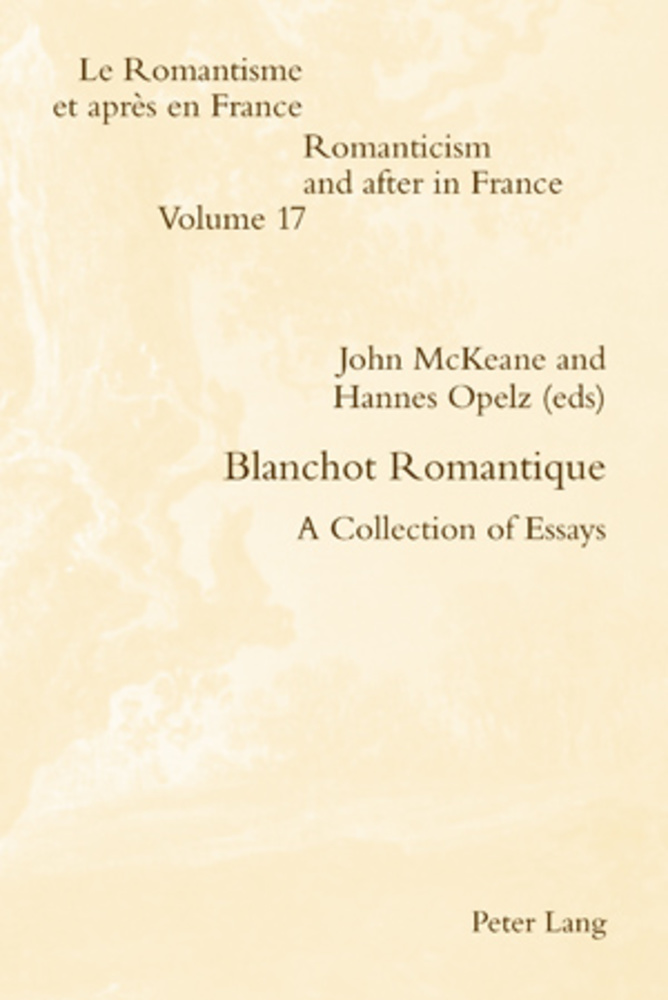
John McKeane and Hannes Opelz (eds)
A collection of Essays
ISBN: 978-3-03911-973-8
317 pages
November 2010
The work of French writer and essayist Maurice Blanchot (1907–2003) is without doubt among the most challenging the twentieth century has to offer. Contemporary debate in literature, philosophy, and politics has yet to fully acknowledge its discreet but enduring impact. Arising from a conference that took place in Oxford in 2009, this book sets itself a simple, if daunting, task: that of measuring the impact and responding to the challenge of Blanchot’s work by addressing its engagement with the Romantic legacy, in particular (but not only) that of the Jena Romantics. Drawing upon a wide range of philosophers and poets associated directly or indirectly with German Romanticism (Kant, Fichte, Goethe, Jean Paul, Novalis, the Schlegels, Hölderlin), the authors of this volume explore how Blanchot’s fictional, critical, and fragmentary texts rewrite and rethink the Romantic demand in relation to questions of criticism and reflexivity, irony and subjectivity, narrative and genre, the sublime and the neutre, the Work and the fragment, quotation and translation. Reading Blanchot with or against key twentieth-century thinkers (Benjamin, Foucault, de Man), they also examine Romantic and post-Romantic notions of history, imagination, literary theory, melancholy, affect, love, revolution, community, and other central themes that Blanchot’s writings deploy across the century from Jean-Paul Sartre to Jean-Luc Nancy. This book contains contributions in both English and French.
John McKeane is Laming Junior Fellow of the Queen’s College, Oxford. His current research looks at the work of Maurice Blanchot as it opens towards the fragmentary and the neutre.
Hannes Opelz studied in London, Paris, Bologna, and Cambridge. His current research concentrates on the work of Maurice Blanchot and on what takes place between literature, politics, philosophy, and experience.
CONTENTS
Acknowledgements
Abbreviations
Introduction: The Absolute, the Fragmentary
HANNES OPELZ and JOHN McKEANE
Legacies (I): Theory
‘Une histoire dans le romantisme?’ Maurice Blanchot et l’Athenæum
GISÈLE BERKMAN
Le Neutre est-il une notion romantique?
CHRISTOPHE BIDENT
L’Auto-réflexivité du sublime
YVES GILONNE
Legacies (II): Praxis
Blanchot and Jean Paul
MICHAEL HOLLAND
Transformations of Romantic Love
SERGEY ZENKIN
Au moment voulu: de mélancolie en mélancolie
JÉRÉMIE MAJOREL
Twentieth-Century Conversations in Romanticism
Blanchot and the Romantic Imagination
IAN MACLACHLAN
Blanchot, Benjamin, and the Absence of the Work
JAKE WADHAM
Unworking Irony’s Work: Blanchot and de Man reading Schlegel
HECTOR KOLLIAS
Romantic Fragmentations
‘A Fine Madness’: Translation, Quotation, the Fragmentary
LESLIE HILL
A Step Askew: Ironic Parabasis in Blanchot
MAEBH LONG
Political Romanticism
Even now, now, very now
MARTIN CROWLEY
The Narrow Margin
IAN JAMES
Écrire la révolution
PARHAM SHAHRJERDI
Appendix
Bibliography
Contributors
Index
